Is Celsius Bad for You? Fact Checking & Ingredient Analysis
As a professional basketball player with a Master’s Degree in Nutrition Education, I love digging into questions such as, “Is Celsius bad for you?”
Based on both scientific research and personal use during training, recovery, and daily routines, my answer is no.
I’ve used Celsius as a pre-workout, a midday energy boost, and even before morning walks, and I believe it’s one of the cleanest energy drinks on the market when used in moderation.
I’ve experimented with numerous energy drinks and supplements to improve performance and optimize overall health, and based on my knowledge and research, I don’t believe Celsius is bad for you, and they don’t contain concerning ingredients, outside of their high caffeine content.
Personally, I do not know why anyone who reads the ingredient label would ask, “Is Celsius bad for you?“
Research indicates that Celsius can help you burn fat, and in my opinion, they are one of the healthiest energy drinks (Fernandez-Sanchez et al., 2024).
Celsius drinks contain 200mg of caffeine, which provides a powerful energy boost and improves mental alertness.
Additionally, from my experience, they don’t provide the jitters or crashes often linked to traditional energy drinks.
Natural caffeine sources like green tea and black coffee are healthier and more natural options, but for people who prefer a stronger jolt of energy from caffeine, Celsius drinks are one of the healthiest energy drinks available.
When evaluating the pros and cons of Celsius energy drinks, there are more benefits of Celsius than health risks, and they are a good option for caffeine drinkers.
So, are Celsius drinks bad for you?
If you can handle the 200mg of caffeine and are looking for a convenient energy drink, I recommend trying Celsius Energy Drinks and reading on to discover more about how it fits into your lifestyle.
What Are Celsius Drinks?
Celsius drinks are a popular line of fitness-oriented caffeinated beverages designed to boost energy, increased metabolism, and support performance.
People often ask, “Is Celsius bad for you?” because of their high caffeine content and bold advertising, which makes people question their overall safety.
Each can contains 200 mg of caffeine from natural sources like green tea extract and guarana, along with ingredients such as taurine, ginger, and essential vitamins.
Unlike many traditional energy drinks, Celsius avoids artificial preservatives and high-fructose corn syrup, positioning itself as a “clean” energy drink option.
Available in canned beverages, on-the-go packets, and powder form, Celsius is especially popular among athletes, gym-goers, and those seeking a stronger alternative to black coffee or tea.
Why Do People Think Celsius Drinks Are Bad for You?
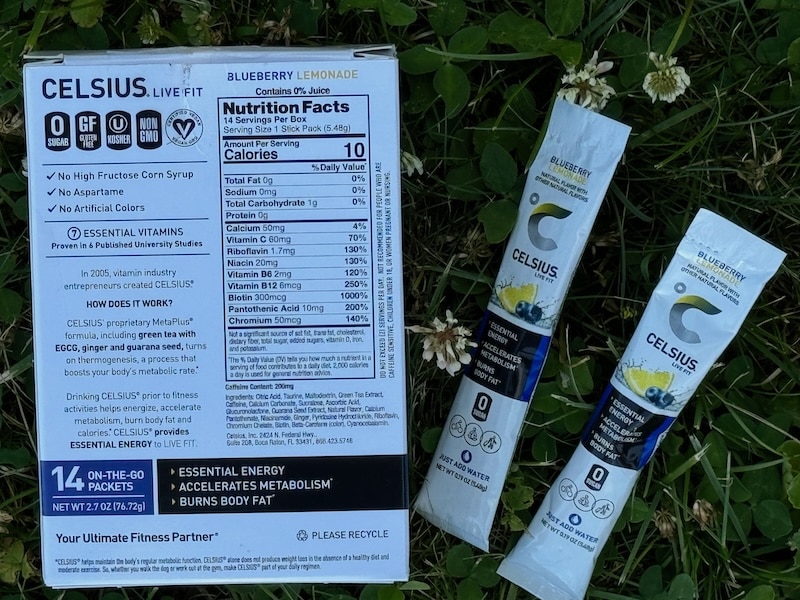
Key Takeaway: Most concerns about Celsius stem from misunderstandings of its high caffeine content and natural stimulants like guarana and green tea extract, which can cause issues in sensitive individuals but are safe for most people in moderation.
Often used as a pre-workout or midday pick-me-up, Celsius energy drinks appeals to those looking to improve performance and stay active.
However, concerns exist about its high caffeine content and active ingredients like guarana, taurine, and green tea extract.
While these compounds can boost metabolism and focus, they may also cause side effects like jitteriness, increased heart rate, or digestive issues in sensitive individuals.
Misunderstandings about these ingredients can lead to questions like, “Are Celsius energy drinks bad for you?”
Although Celsius aims to promote clean energy, it’s important to consume it in moderation, especially for those sensitive to stimulants.
Below, we explore some key reasons why people might think Celsius drinks are unhealthy or bad for you.
High Caffeine Content
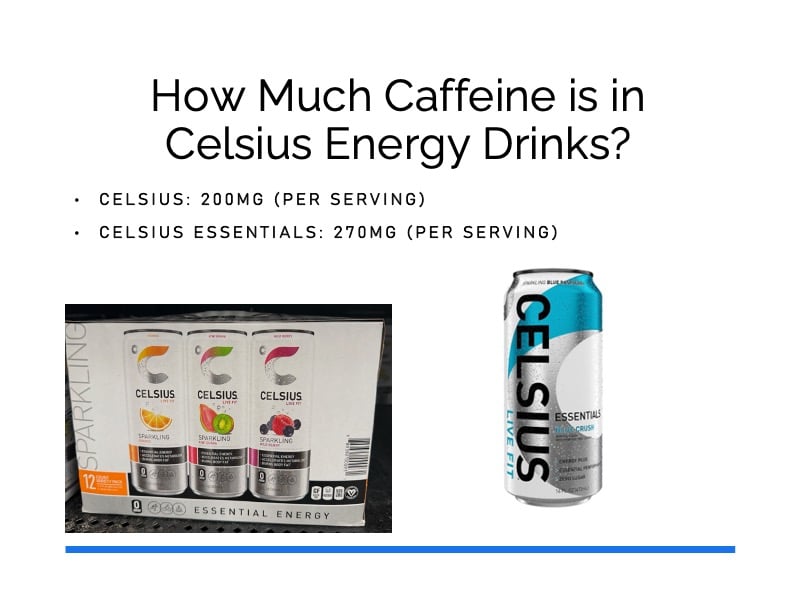
Each serving of Celsius contains around 200 mg of caffeine, and while this amount can provide a substantial energy boost, consuming it in excess may lead to side effects like an increased heart rate, elevated blood pressure, and heightened anxiety.
High caffeine intake can also worsen symptoms of anxiety disorders, potentially triggering issues like panic attacks and mood swings.
For those with preexisting heart conditions or high blood pressure, the caffeine content could pose additional risks and should be carefully monitored.
When comparing Celsius vs. Celsius Essentials, it’s also worth noting that Celsius Essentials contains even more caffeine per serving—270 mg—which might not be suitable for everyone, especially those sensitive to caffeine.
Additionally, Celsius On-the-Go Packets offer a convenient and portable option, providing the same energy-boosting benefits as the canned versions but with a slightly different format.
These packets typically contain about 200 mg of caffeine per serving, aligning with the original Celsius but allowing users to mix their drinks on the go.
For healthy individuals, the FDA-recommended daily caffeine intake limit is 400 mg, meaning most people can safely enjoy one Celsius energy drink or Celsius packet per day without concern.
Potential Vitamin & Mineral Overconsumption
Celsius drinks contain amounts of vitamins like biotin and B vitamins exceeding 100% of the RDA, potentially causing side effects such as nerve damage and digestive issues (NIH, 2020).
However, Biotin doesn’t have a specific upper tolerable intake, and even high doses of biotin intake is unlikely to cause negative health effects.
Analysis of Ingredients in Celsius Drinks
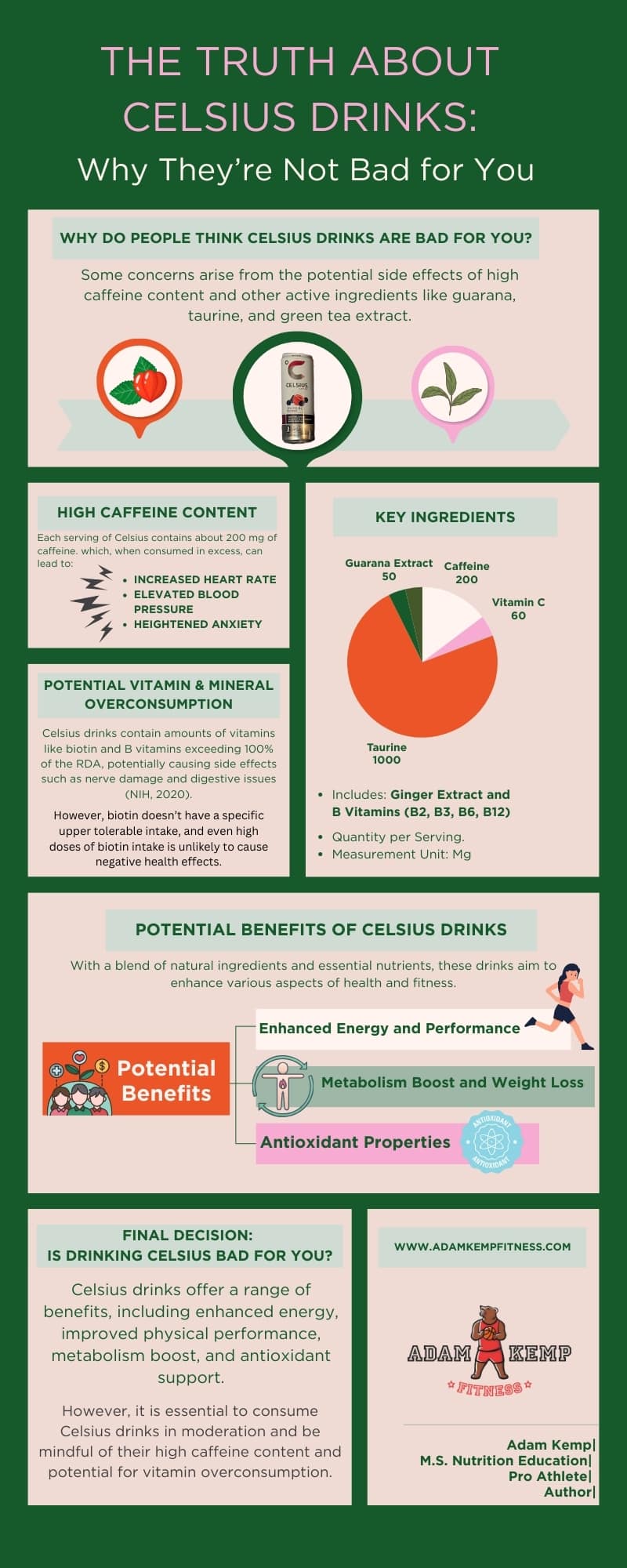
Quick Verdict: The ingredients in Celsius Drinks, including caffeine, taurine, ginger, and green tea extract, are generally recognized as safe and scientifically backed for energy, metabolism, and performance, though some may cause mild side effects in certain users.
| Ingredient | Quantity per Serving |
|---|---|
| Caffeine | 200 mg |
| Vitamin C | 60 mg |
| B Vitamins | Various (B2, B3, B6, B12) |
| Taurine | 1000 mg |
| Guarana Extract | 50 mg |
| Green Tea Extract | 50 mg |
On platforms like TikTok, Celsius energy drinks are often scrutinized for ingredients such as guarana, taurine, green tea extract, and sucralose.
However, these are not concerning ingredients, although you should always be concerned about energy drinks that are labeled as “supplements” because those are not required by the FDA to be properly regulated.
Vitamins and Minerals
Celsius is fortified with a range of essential vitamins and minerals, particularly B6, B12, vitamin C, and chromium, all of which support energy production, metabolism, and immune function.
These nutrients help convert food into usable energy, assist in blood sugar regulation, and contribute to a stronger immune response.
While it’s always ideal to prioritize whole foods over supplements, Celsius can act as a convenient supplement for those with active lifestyles and higher nutrient demands.
Caffeine
Each on-the-go packet or can of Celsius contains 200 mg of caffeine, derived from natural sources like green tea extract and guarana.
This dose is roughly equivalent to two strong cups of coffee and is designed to improve mental alertness, endurance, and physical performance.
While moderate caffeine intake is safe for most healthy adults, consuming it in combination with other stimulants may increase the risk of jitteriness or anxiety, especially for caffeine-sensitive individuals.
Ginger Extract
Ginger extract in Celsius offers more than just a natural flavor, it’s included for its well-researched anti-inflammatory and digestive benefits (Anh et al., 2020).
Ginger has been shown to support gut health, reduce nausea, and contribute to improved recovery by decreasing inflammation post-exercise, making it a valuable addition to Celsius drinks.
Guarana
Guarana is a natural plant extract that contains caffeine and contributes to Celsius’ sustained energy effect.
Although some people confuse it with synthetic stimulants, guarana is simply a plant-based caffeine source that provides a slower, more gradual energy release.
It’s also rich in antioxidants, which can help reduce oxidative stress and support long-term health.
Still, when combined with other stimulants, it can amplify side effects like restlessness or increased heart rate in sensitive individuals.
Taurine
Taurine is an amino acid found naturally in the human body, where it supports brain, heart, and muscle function.
In Celsius drinks, taurine is included to improve mental focus and reduce fatigue, working in synergy with caffeine to provide smoother energy without sharp crashes.
Although social media sometimes associates taurine with synthetic additives, research consistently supports its safety and usefulness in exercise performance and cardiovascular health.
Green Tea Extract
Green tea extract is one of the most beneficial ingredients in Celsius, offering both metabolic and antioxidant benefits.
It contains caffeine and catechins, specifically EGCG, which have been shown to support fat oxidation and metabolic rate.
Despite occasional claims of side effects like nausea when over-consumed, green tea extract is well tolerated in moderate amounts and plays a central role in why Celsius is good for weight loss and can support fat burning.
Sucralose
Sucralose, the artificial sweetener in Celsius, sparks debate over its effects on gut health and metabolism.
Concerns about artificial ingredients often lead to skepticism about its role in a “clean” energy drink.
Potential Benefits of Celsius Drinks
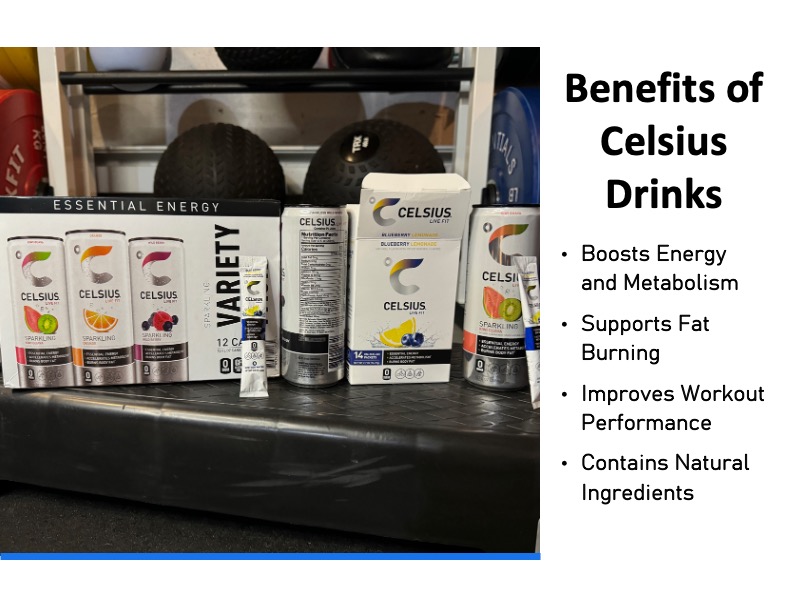
When asking, “Is Celsius bad for you?” it’s equally important to consider the potential benefits of Celsius drinks—especially when compared to traditional energy beverages.
Celsius is formulated with natural caffeine sources, metabolism-boosting compounds, and essential vitamins that go beyond just delivering a quick jolt of energy.
With ingredients like green tea extract, guarana, ginger, and B vitamins, Celsius supports endurance, mental focus, and fat oxidation—making it a performance-enhancing option for people with active lifestyles.
Increased Energy
Celsius delivers a clean energy boost thanks to its blend of natural caffeine sources like green tea extract and guarana.
Unlike traditional energy drinks loaded with sugar or synthetic additives, Celsius provides smoother, more sustained energy with minimal risk of a crash.
Taurine further supports this effect by helping to stabilize energy levels and reduce the jittery feeling some people get from caffeine alone.
Improved Physical and Mental Performance
The ingredients in Celsius are designed to improve physical stamina and cognitive performance.
Research supports caffeine, in particular, for its ability to increase endurance, improve focus, and delay fatigue during exercise (Dodd, 1993).
This makes Celsius an effective pre-workout option or midday pick-me-up for those who want to improve their physical and mental performance.
Easier Fat Burning and Weight Loss
Although people occasionally wonder if Celsius drinks cause weight gain because they are an energy drink and many energy drinks are unsafe, Celsius drinks can help you burn fat by increasing your energy levels and supporting fat oxidation.
Ingredients such as green tea extract, which contains catechins and caffeine, are known to increase thermogenesis—the process by which the body burns calories to produce heat.
Studies have shown that these compounds can help increase metabolic rate and promote fat oxidation, thereby aiding in weight loss efforts (Hursel et al., 2011).
Additionally, chromium, included in Celsius drinks, plays a role in regulating blood sugar levels and reducing cravings, which can further support weight management.
Antioxidant Properties
Celsius drinks are rich in antioxidants, particularly from green tea extract and vitamin C.
Antioxidants help combat oxidative stress and protect cells from damage caused by free radicals.
This can contribute to overall health and well-being, supporting the body’s ability to recover from exercise and daily stressors.
The presence of ginger extract adds to the antioxidant capacity of the drink, providing anti-inflammatory benefits that can support joint health and overall physical recovery.
Side Effects of Celsius Drinks
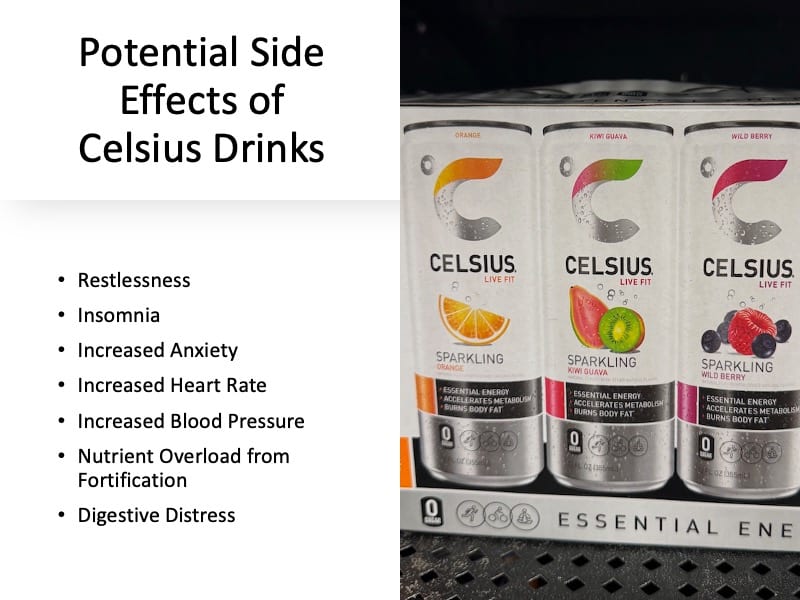
Key Points: While Celsius is safe for most healthy adults, its stimulants and artificial sweetener may lead to side effects like jitteriness, digestive upset, or disrupted sleep, especially if over-consumed or combined with other caffeine sources.
Although Celsius is marketed as a clean, fitness-focused energy drink, it contains powerful bioactive compounds that can affect individuals differently based on their sensitivity to caffeine, digestive health, and overall diet.
With 200 mg of caffeine per can, roughly the amount found in two strong cups of coffee, Celsius may lead to symptoms such as restlessness, elevated heart rate, anxiety, or insomnia in more sensitive individuals.
Some may also experience headaches or gastrointestinal upset, particularly if consumed on an empty stomach or alongside other stimulants.
Monitoring your response and understanding your personal tolerance is essential when deciding whether Celsius is a smart fit for your daily routine.
Increased Heart Rate or Blood Pressure
Caffeine, guarana, and green tea extract all act as central nervous system stimulants.
While beneficial for energy and performance, they can temporarily elevate heart rate and blood pressure, which may be risky for individuals with cardiovascular conditions or hypertension.
Monitoring your response to a full can and starting with half a serving may be helpful if you’re unsure of your tolerance.
Sleep Disruption
Celsius is best consumed in the morning or before workouts.
Drinking it later in the day may interfere with your circadian rhythm and reduce sleep quality due to its long half-life of caffeine (3–7 hours on average).
Poor sleep can negatively impact recovery, hormone regulation, and metabolic health.
Nutrient Overload from Fortification
Celsius contains high doses of certain B vitamins and biotin—often exceeding 1000% of the RDA.
While these are water-soluble and generally excreted through urine, chronic overconsumption from multiple fortified products could contribute to side effects like nerve tingling, nausea, or imbalance in nutrient intake.
Though most individuals won’t experience issues from one can per day, those already using supplements or multivitamins should double-check for redundancies.
Digestive Distress
Artificial sweeteners like sucralose, which is included in Celsius, can occasionally cause bloating, gas, or changes in gut microbiota in sensitive individuals.
Additionally, ingredients like green tea extract and ginger may irritate the stomach lining in higher doses or when consumed too quickly.
Is Celsius Safe to Drink?
For most healthy adults, Celsius energy drinks are safe to consume in moderation.
Each can contains 200 mg of caffeine, sourced naturally from green tea extract and guarana.
This amount sits comfortably within the FDA’s recommended daily caffeine limit of 400 mg, but it’s important to remember that combining Celsius with other stimulants—like coffee or pre-workout supplements—can quickly push you over that threshold.
Celsius also includes taurine, green tea extract, and ginger, which are generally recognized as safe and even beneficial.
However, sensitive individuals or those with preexisting heart conditions, anxiety, or high blood pressure may experience side effects like elevated heart rate, jitteriness, or sleep disruption.
Artificial sweeteners like sucralose are another point of debate.
While research is ongoing, current evidence supports its safety when consumed within acceptable daily intake levels.
If you’re someone who avoids artificial ingredients altogether, this could be a deciding factor.
From my experience as a professional athlete and nutrition educator, Celsius is one of the safest energy drinks available—especially compared to conventional options loaded with sugar, artificial dyes, or synthetic stimulants.
If you’re healthy, stay under one can per day and monitor how your body responds.
If you have health conditions or take medications, check with your doctor before adding Celsius to your daily routine.
Are Any Celsius Ingredients Bad for You?
Most of the ingredients in Celsius energy drinks are generally recognized as safe when consumed in moderation.
However, some compounds may raise concerns depending on individual tolerance, dosage, and overall diet.
In general, none of the ingredients in Celsius are “bad” on their own, but they can become problematic when consumed excessively or without consideration of your unique health profile.
Is One Celsius a Day Bad for You?
For most healthy individuals, drinking one Celsius per day is not bad for you.
Each can contains 200 mg of caffeine—half of the FDA’s recommended daily limit of 400 mg for adults.
If you’re not combining it with other high-caffeine products, one Celsius is generally safe and unlikely to cause negative side effects.
However, some people may be more sensitive to caffeine and stimulants like guarana or green tea extract.
In those cases, even a single can could lead to jitteriness, anxiety, or trouble sleeping—especially if consumed later in the day.
Celsius also contains high doses of B vitamins and sucralose.
While these ingredients are considered safe, daily overconsumption through energy drinks and supplements can contribute to nutrient imbalances or digestive discomfort in certain individuals.
Personally, I’ve used one Celsius a day during intense training or travel days and haven’t experienced any negative effects.
If your body handles it well, one can per day is likely safe and may even support your energy, metabolism, and focus—just pay attention to how it fits with your total caffeine and nutrient intake.
Are Celsius Drinks Bad for Your Heart?
The question “Are Celsius drinks bad for your heart?” often comes up due to the high caffeine content—200 mg per can—and added stimulants like guarana and green tea extract.
For healthy individuals, moderate caffeine intake is generally considered safe and not linked to increased heart disease risk (Mostofsky et al., 2012).
However, sensitive individuals or those with conditions like high blood pressure or arrhythmias may experience increased heart rate, anxiety, or palpitations.
Guarana and green tea contribute additional caffeine and stimulant effects, which can amplify cardiovascular stress if combined with other sources of caffeine or consumed in excess.
Personally, as a professional athlete, I monitor my heart rate closely and have found Celsius to be one of the cleaner, more heart-conscious energy drinks—when used responsibly and in moderation.
If you have a heart condition or are unsure of your caffeine tolerance, talk to your doctor before adding Celsius to your routine.
Final Thoughts: Are Celsius Bad for You?
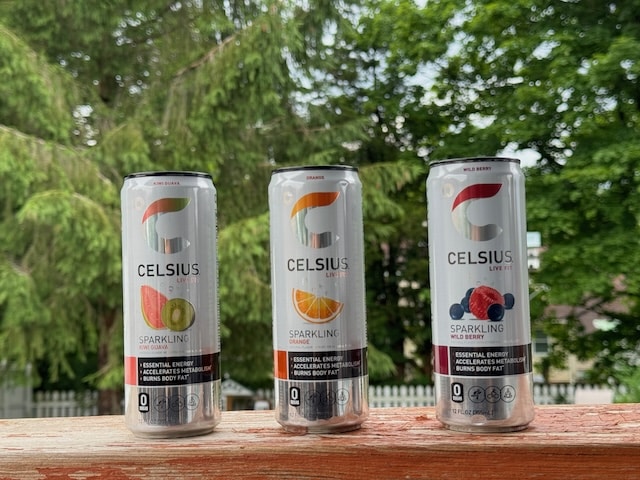
So, is Celsius bad for you? For most healthy adults, the answer is no, when used responsibly.
In my opinion, Celsius drinks are one of the healthiest energy drinks.
What sets Celsius apart from traditional energy drinks like Red Bull or Monster is its lack of added sugar, artificial preservatives, and synthetic stimulants.
Its combination of naturally sourced caffeine, green tea extract, taurine, ginger, and B vitamins provides more than just an energy boost, it supports mental focus, metabolic function, and even fat oxidation.
However, Celsius is not for everyone.
If you’re caffeine-sensitive, already supplementing with B vitamins, or managing cardiovascular or digestive issues, you’ll want to use caution or consult your doctor before regular use.
Overconsumption, especially when combined with coffee or pre-workouts, can lead to sleep disruption, digestive upset, or elevated blood pressure.
That said, if you’re looking for a performance-driven, low-calorie energy drink to support workouts, fat loss, or demanding workdays, Celsius is a solid choice.
Just stick to one can per day, avoid stacking it with other caffeine sources, and stay attuned to how your body reacts.
Final verdict: Celsius drinks are not bad for you if you’re healthy, mindful of your intake, and use them to supplement, not replace, a balanced diet and healthy lifestyle.
Last update on 2025-05-09 / This article includes affiliate links/Images via Amazon Product Advertising API. I may earn commissions on purchases made through these links.
Frequently Asked Questions
Read Next: Celsius vs Red Bull




